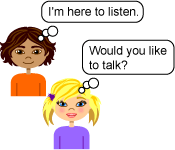|
|
|
|
|
STRESS
Back to top
HOW CAN I TELL IF SOMEONE IS STRESSED?
Stress is the feeling we get when we are in difficult situations. Stress is often described as a mix of feelings: frustration, anxiety, nervousness, anger, fear, confusion, and even sadness. Stress can be caused by many different things, including homework or tests, problems with friends and/peers at school moving or changing schools, the separation or divorce of parents, changes in your body, illness or financial problems in the family, or a death of a loved one.
Some signs of stress are:
| Sweating
|
Procrastinating or not completing school work
|
| Face might turn red
|
Feeling more tired than usual
|
| Muscles feel tight
|
Having trouble falling or staying asleep
|
| Stomach or head aches
|
Eating more or eating less
|
| Fast heart beat
|
Trouble breathing
|
| Difficulty concentrating on school
|

Stress can cause us to have negative thoughts and feelings about ourselves. We might spend less time doing the things we enjoy and more time alone. In small amounts, stress can actually be helpful. Too much stress, without ways to cope or manage it, can feel overwhelming.
Back to top
HOW CAN I ENCOURAGE SOMEONE TO GET HELP?
Helping a friend who is stressed can be tough. It's normal to feel many different emotions (worried, confused, and angry) when you try to help someone, especially if they don't understand that you're trying to help. If your friend wants to talk, listen. Helping a friend does not mean you are responsible for fixing his or her problems. What you can offer is a listening ear. Be supportive and encourage them to get help from adults who they can talk to.
Back to top
WHAT MIGHT BE HELPFUL?
- If you think you might be stressed, pay attention to your body. What do you feel in your body? Take a deep breath and relax your muscles.
- Pay attention to your thoughts. What are you thinking about?
- Learn relaxation exercises in Wellness Center and practice them
- Eat a balanced diet and exercise regularly
- Break a large assignment into smaller parts that are easier to complete
- If you can, take a break from stressful situations. Listening to music, talking to a friend, drawing, writing, or spending time with a pet can be helpful.
- Talk to an adult you trust. Don't keep your feelings inside.
- No one is perfect. Learn to feel good about doing the best you can.
- Have a group of friends who help you cope in healthy ways
- Try to stop negative thoughts. Instead of thinking "I will never finish this project" say "This is hard for me right now but I know I will get through it. I can always ask for help if I need some support."
- If you think a friend seems really stressed, encourage him/her to get help from an adult. Do not try to solve the problem yourself, but instead offer to help with making phone calls or going to appointments.
- When you are really worried about someone's safety, it is ok to talk to them about it. If you are worried about your friend's safety - ask and listen! Suicide hotline: 1-800-273-TALK
Back to top
WHAT MIGHT NOT BE SO HELPFUL?

- Telling someone to get over it or that s/he is being too sensitive or dramatic, or avoiding the person
- Risky behaviors like using alcohol, drugs, binge eating, cutting, fighting or bullying others
- Procrastinating
- Ignoring the problem or trying to pretend it doesn't exist
- Not asking for help or sharing how you feel with someone you trust
Disclaimer: Material in Whyville's Wellness Center is intended as general information. It is not a recommendation for treatment,
nor should it be considered medical or mental health advice. Whyville's Wellness Center urges families to discuss all information
and questions related to medical or mental health care with a health care professional.
|
|
|
|
|